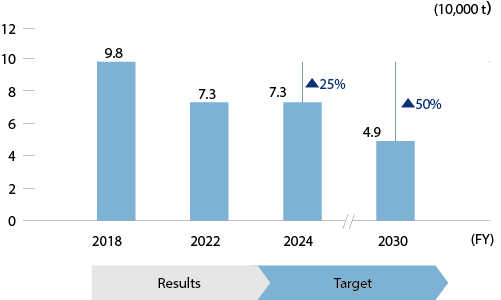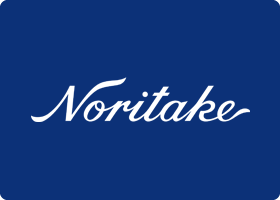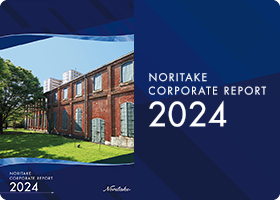Disclosure based on TCFD Recommendations
Sustainability Initiatives
- Contribute to the Global Environment
- Contribute to a Convenient Society
- Contribute to the People’s Well-being
- Strengthen the Foundation
In August 2022, Noritake announced its endorsement of the Task Force on Climate-Related Financial Disclosures (TCFD*) recommendations established by the Financial Stability Board (FSB).
The Noritake Group, as a company that manufactures products based on its founding spirit of “Good Quality, Export and Co-prosperity” positions the preservation of the global environment as an important management issue, and aims to achieve a “sustainable society” through its business activities. In order to fulfill our responsibilities to our customers and other stakeholders, we will identify risks and opportunities and consider countermeasures in accordance with the TCFD recommendations and reflect them in our management.

About TCFD
TCFD stands for Task Force on Climate-Related Financial Disclosures and was established in December 2015 by the Financial Stability Board (FSB) at the request of the G20. In June 2017, the TCFD released a report recommending the disclosure of information on risks and opportunities related to climate change, and companies and institutions around the world have endorsed the recommendations.
Review structure
In FY2022, a cross-company project team ('Taskforce') was set up within the Noritake Group, overseen by the President, to focus on the identification of risks and opportunities and measures to deal with their impact. Members from various business units participated in the analysis, which incorporated multifaceted opinions.
From FY2023, the Noritake Group comprehensively manages the analyzed risks and opportunities under the newly established sustainability promotion system, and promotes sustainability management as the Noritake Group, including the climate change response.
Scope of consideration
The business scope covered all major businesses, including Group companies, and the geographical scope covered Japan, which has a high proportion of sales, as well as the other major overseas areas.
The base year for the risk and opportunity assessment is set at 2030, when social changes towards a low-carbon society will have an impact on our business.
Reference scenarios
Reference is made to the IEA World Energy Outlook 2021*1 for transition risks and the SSP scenario*2 of the Intergovernmental Panel on Climate Change (IPCC) for physical risks.
*1 NZE (Net Zero Emission by 2050) for the 1.5°C scenario, APS (Announced Pledges Scenario) and SDS (Sustainable Development Scenario) for the 2°C scenario, and STEPS (Stated Policies Scenario) for the 4°C scenario
*2 SSP1-1.9 for 1.5°C scenario, SSP1-2.6 for 2°C scenario, and SSP5-8.5 for 4°C scenario
Governance
Under the supervision of the “Sustainability Management Committee” chaired by the President, the “Environmental Committee” deliberates activity plans based on results of activities, and provides unified guidelines for environmental protection promotion activities in order to spearhead climate change-related initiatives at the Noritake Group.
Strategy
The Noritake Group's strategy consideration process is as follows.
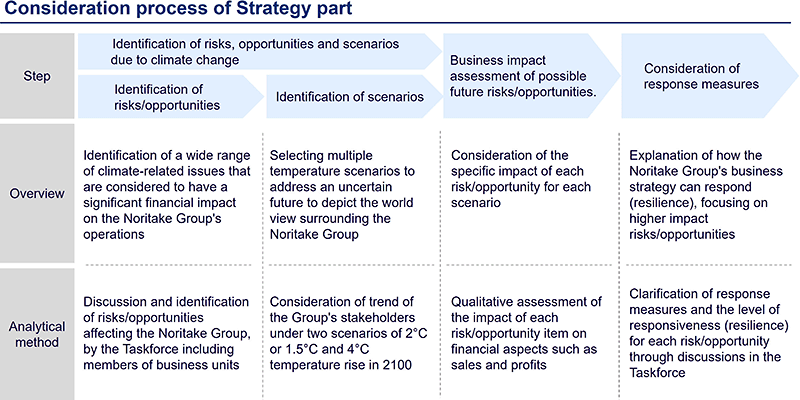
In 2030, it is assumed that in the 2°C or 1.5°C scenarios, there will be a significant impact on societal changes due to policy transitions, while in the 4°C scenario, there will be a greater focus on physical impacts such as weather-related events. In light of this, our Group has examined risks and opportunities based on two scenarios: the “risks related to the transition towards a low-carbon society” which would occur during the progression to the 2°C or 1.5°C scenario, and the “risks related to the physical impacts associated with climate change” which would arise if the global fails to achieve adequate climate change mitigation measures and reaches the 4°C scenario.
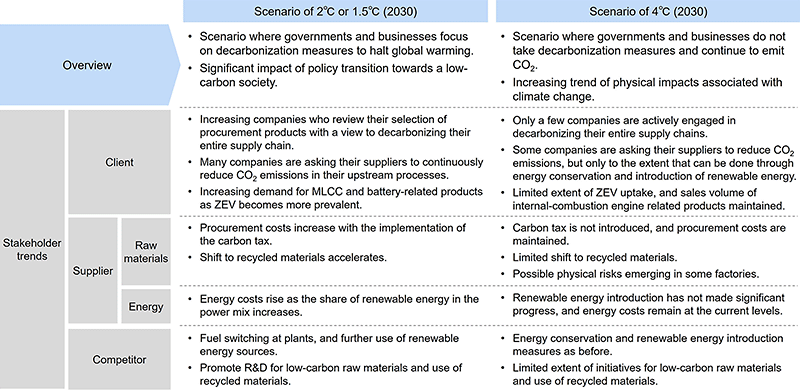
*1 Vision of society in 2030 under the scenario of an expected temperature rise of 1.5°C to 4°C by 2100
*2 ZEV: Zero Emission Vehicle
*3 MLCC: Multi Layered Ceramic Capacitor
9 risks have been identified for the Noritake Group, and the magnitude of their impact in 2030 has been assessed as follows.
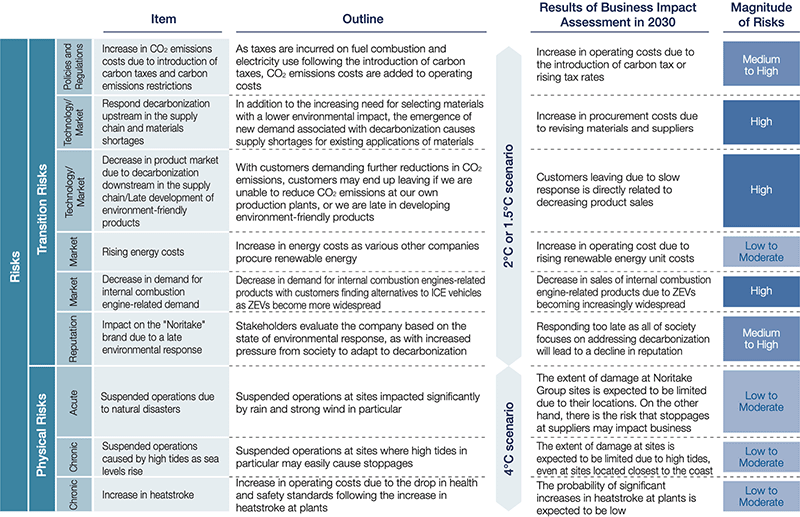
In contrast, the magnitude of opportunities impact in 2030 is assessed as follows.
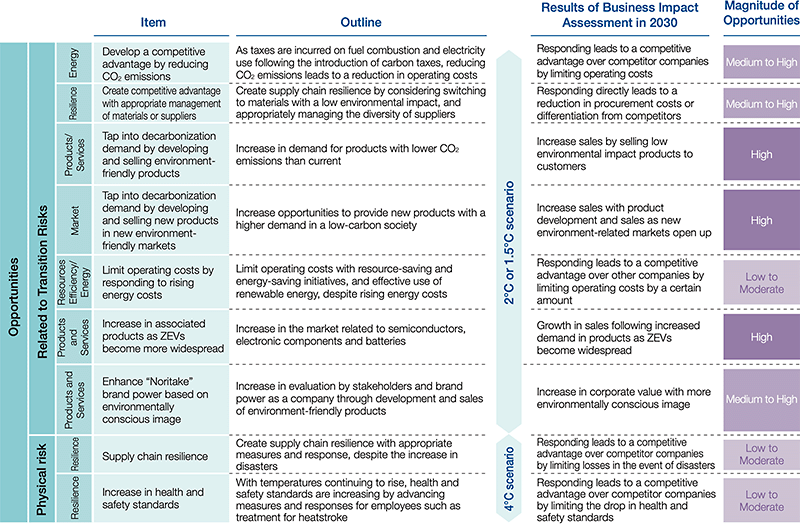
The Noritake Group is required to take measures to turn risks into opportunities and to increase management resilience.
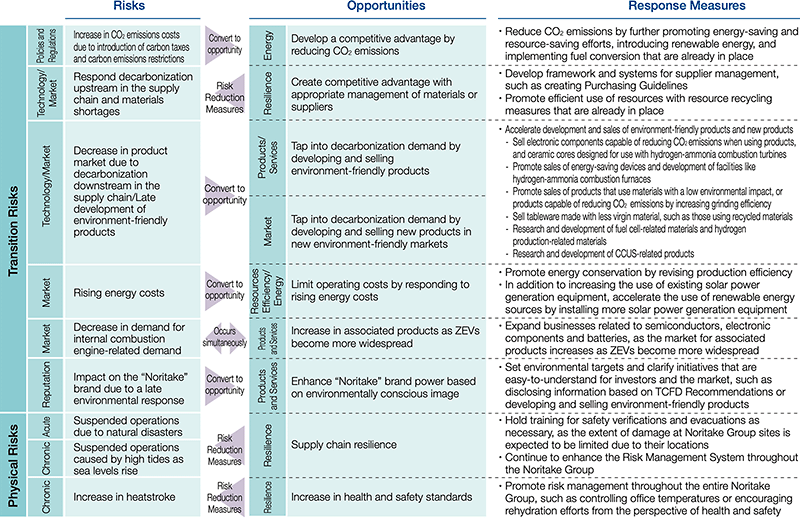
* CCUS: Carbon dioxide Capture, Utilization and Storage
Risk Management
The Taskforce established in 2022 analyzed, assessed and reported to the Board of Directors the management of risks related to climate change. The “Sustainability Management Committee” established in April 2023 analyzes and assesses risks surrounding our Group including climate change, with the severe risks identified in FY2023 reported to the Board of Directors.
Indicators and Targets
In order to transition to a low-carbon society and achieve net zero CO2 emissions by 2050, the Group has set the target of reducing CO2 emissions (Scope1, 2) to 73,000 t (at least 25% less than FY2018 level) by FY2024, and 49,000 t (50% less than FY2018 level) by FY2030. We will also establish a method to calculate CO2 emissions (Scope 3) from companies in the supply chain other than our group companies, set targets and examine the approach to achieve them.
Scope1, 2 (company’s CO2 emissions) reduction plan
